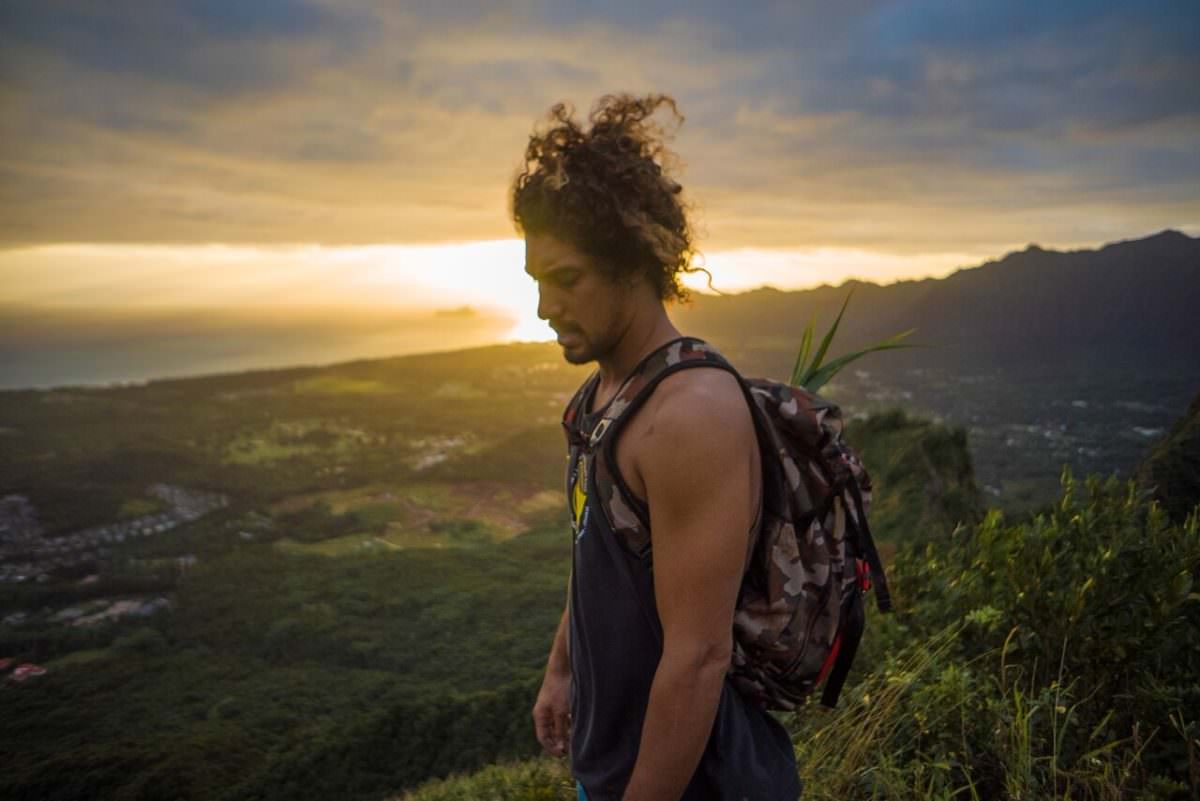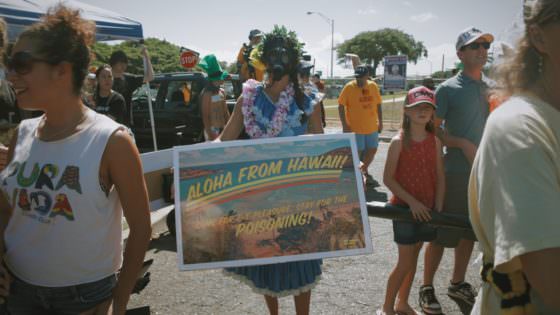A Pro Surfer-Filmmaker Casts His Camera on Hawaii’s GMO Debate
Pro surfer and filmmaker Cyrus Sutton’s latest doc, “Island Earth” explores the GMOs and indigenous farming practices in Hawaii.
A Pro Surfer-Filmmaker Casts His Camera on Hawaii’s GMO Debate
Pro surfer and filmmaker Cyrus Sutton’s latest doc, “Island Earth” explores the GMOs and indigenous farming practices in Hawaii.

The 63-minute documentary that took Sutton two and a half years to complete tells the story of Hawaii’s challenges involving GMOs, the food system, and the fight for who gets to determine how the land is used. The film is in part told through the eyes of indigenous scientist Cliff Kapono, who went into biotechnology with the hope of helping Hawaiians but whose beliefs were shaken up by what he saw happening in his home state.

The Hawaiian Islands are blessed with fertile lands, which has made them a prime location for the world’s biggest multinational agrochemical and agricultural biotechnology companies, like Monsanto, Dow, and Pioneer, to test new GMO seed varieties using restricted-use pesticides. Accusations of drifting pesticides adversely affecting residents near the test fields resulted in protests beginning around 2012 that helped spur attempts to legislate GMO use on the various islands. A series of court battles between the ag companies and county governments followed ending in a federal Appeals Court decision this past November that struck down the local laws regulating GMOs.
While large swaths of land on the islands are used for testing seeds, Hawaii relies on imports for as much as 90 percent of its food, an imbalance that’s explored in “Island Earth.” The film also looks at the farmers who have been using regenerative farming techniques, including the practices of their indigenous ancestors, to try and reverse this reliance on outside food sources. Many people, including Sutton, believe these ancient growing practices may hold the key to an alternative, and ultimately better, way of feeding the world’s growing population.
Modern Farmer caught up with Sutton by phone from his home in Washington State’s Columbia River Gorge, where he’s getting into growing his own food, including recently planting 60 fruit trees on his property. Sutton is touring with the film in the northwest and will be in New York City in June before its release on various view-on-demand sites (like iTunes) at the end of June. You can find out if the film will be coming to your city here or learn about hosting your own screening here.
To say GMOs are bad is akin to saying something like a cellphone is inherently bad because it gives off radiation. I don’t think we’re going to get very far in the conversation if we villainize a specific technology.
Modern Farmer: How and why did you get interested in telling this story?
Cyrus Sutton: I have friends in the surfing community who have been pretty vocal about the issue and that got it on my radar. I used to live in San Diego where the main character of the film, Cliff Kapono, is getting his PhD in chemistry and where he got his Masters degree in biotechnology. I was surfing with him and he was telling me about being groomed to work for these chemical companies. He’s got an insider perspective on it both as a native Hawaiian and active member of the Hawaiian community, and as somebody who was on track to work for these kinds of companies.
As a professional surfer, it’s kind of my job to show this romantic connection humans have with the ocean. It’s the icing on the cake of life and as a storyteller I don’t feel right making movies about the icing on the cake without acknowledging issues about why I’m able to have that freedom to surf. That’s why I focused on Hawaii and the indigenous knowledge that’s there and how it could inform how we grow food.
MF: Did you try to approach this story, which revolves around hot-button issues like GMOs, with an open mind?
CS: I have a friend who’s a really successful documentary editor and he gave me the advice that documentaries at their best are structured research and need to be approached with a spirit of curiosity and humility. I’m privileged because I’m able to buy food based on my values, which has led me to mostly eating organic and wanting to grow my own food. Making this movie, I tried to check my biases at the door. I’ve learned since making this film that to say GMOs are bad is akin to saying something like a computer or cellphone is inherently bad because it gives off radiation, or that nuclear power is bad. I don’t think we’re going to get very far in the conversation if we villainize a specific technology, but I am deeply concerned by our society’s deployment of those [GMO] technologies. These companies hold up niche applications of GMO technology, like golden rice or the GMO papaya, as potentially feeding the world, but the vast majority of its use is to create resistance to proprietary blends of chemicals, and this is all being tested in Hawaii. as a storyteller, I needed to cut through that greenwashing and let people know what’s actually going on.
MF: What did you learn while making the film?
CS: I had my mind blown those first few months by the complexity of the issue. The majority of the genetically-modified seeds in the United States have been produced on the islands of Hawaii over the past few decades. And that’s because they get three corn growing seasons a year. Those seeds are then exported to the midwest, where they’re planted and used to provide calories for livestock, biofuels, and industrial products we consume as Americans.
This film taught me that there are a lot of people who are trying to make the world a better place: scientists, policy makers and other people who really want to understand the solutions. I’m simultaneously feeling dread of where we’re at and how our government has become coopted by private influence, while I’m also incredibly hopeful on a person-to-person level because of how many feel the same way I do and are looking for ways to improve literacy about the natural world and a desire for better stewardship. We just need to share it in a way that’s inclusive and inspiring.
Island Earth Trailer from www.KORDUROY.tv on Vimeo.
This interview has been edited for clarity.
Follow us
This work is licensed under a Creative Commons Attribution-NoDerivatives 4.0 International License.
Want to republish a Modern Farmer story?
We are happy for Modern Farmer stories to be shared, and encourage you to republish our articles for your audience. When doing so, we ask that you follow these guidelines:
Please credit us and our writers
For the author byline, please use “Author Name, Modern Farmer.” At the top of our stories, if on the web, please include this text and link: “This story was originally published by Modern Farmer.”
Please make sure to include a link back to either our home page or the article URL.
At the bottom of the story, please include the following text:
“Modern Farmer is a nonprofit initiative dedicated to raising awareness and catalyzing action at the intersection of food, agriculture, and society. Read more at <link>Modern Farmer</link>.”
Use our widget
We’d like to be able to track our stories, so we ask that if you republish our content, you do so using our widget (located on the left hand side of the article). The HTML code has a built-in tracker that tells us the data and domain where the story was published, as well as view counts.
Check the image requirements
It’s your responsibility to confirm you're licensed to republish images in our articles. Some images, such as those from commercial providers, don't allow their images to be republished without permission or payment. Copyright terms are generally listed in the image caption and attribution. You are welcome to omit our images or substitute with your own. Charts and interactive graphics follow the same rules.
Don’t change too much. Or, ask us first.
Articles must be republished in their entirety. It’s okay to change references to time (“today” to “yesterday”) or location (“Iowa City, IA” to “here”). But please keep everything else the same.
If you feel strongly that a more material edit needs to be made, get in touch with us at [email protected]. We’re happy to discuss it with the original author, but we must have prior approval for changes before publication.
Special cases
Extracts. You may run the first few lines or paragraphs of the article and then say: “Read the full article at Modern Farmer” with a link back to the original article.
Quotes. You may quote authors provided you include a link back to the article URL.
Translations. These require writer approval. To inquire about translation of a Modern Farmer article, contact us at [email protected]
Signed consent / copyright release forms. These are not required, provided you are following these guidelines.
Print. Articles can be republished in print under these same rules, with the exception that you do not need to include the links.
Tag us
When sharing the story on social media, please tag us using the following: - Twitter (@ModFarm) - Facebook (@ModernFarmerMedia) - Instagram (@modfarm)
Use our content respectfully
Modern Farmer is a nonprofit and as such we share our content for free and in good faith in order to reach new audiences. Respectfully,
No selling ads against our stories. It’s okay to put our stories on pages with ads.
Don’t republish our material wholesale, or automatically; you need to select stories to be republished individually.
You have no rights to sell, license, syndicate, or otherwise represent yourself as the authorized owner of our material to any third parties. This means that you cannot actively publish or submit our work for syndication to third party platforms or apps like Apple News or Google News. We understand that publishers cannot fully control when certain third parties automatically summarize or crawl content from publishers’ own sites.
Keep in touch
We want to hear from you if you love Modern Farmer content, have a collaboration idea, or anything else to share. As a nonprofit outlet, we work in service of our community and are always open to comments, feedback, and ideas. Contact us at [email protected].by Andrew Amelinckx, Modern Farmer
May 15, 2017
Modern Farmer Weekly
Solutions Hub
Innovations, ideas and inspiration. Actionable solutions for a resilient food system.
ExploreExplore other topics
Share With Us
We want to hear from Modern Farmer readers who have thoughtful commentary, actionable solutions, or helpful ideas to share.
SubmitNecessary cookies are absolutely essential for the website to function properly. This category only includes cookies that ensures basic functionalities and security features of the website. These cookies do not store any personal information.
Any cookies that may not be particularly necessary for the website to function and are used specifically to collect user personal data via analytics, ads, other embedded contents are termed as non-necessary cookies.